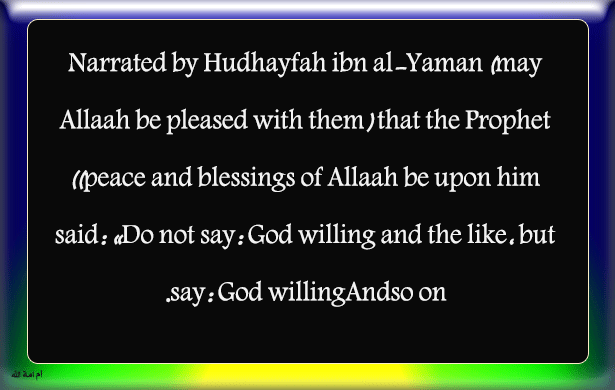Modern interpretation: «Do not say
: God willing, so and so, but say: God willing, and so will».

الإنجليزية
Hudhayfah ibn al-Yamān (may Allah be pleased with him) reported that the Prophet (may Allah's peace and blessing be upon him) said: "Do not say: What Allah wills and what so-and-so wills, rather say: What Allah wills and then what so-and-so wills.”
Explanation
The Prophet (may Allah's peace and blessings be upon him) forbade joining a creature's name with the name of the Creator while talking about divine will and the like because both names, in this case, will be put on an equal footing. The conjunction 'and' is generally used for joining two things or more, with no indication of order. The equation of the creature with the Creator is polytheism. The Prophet (may Allah's peace and blessings be upon him) stated that it is permissible to mention the Creator's name along with the name of the creature using the conjunction ‘then', which implies that the following word is a subordinate of the one preceding ‘then' and this involves no jeopardy.
الفرنسية
Hudhayfah ibn Al-Yamân (qu'Allah l'agrée) rapporte que le prophète (paix et salut sur lui) a dit : « Ne dites pas : « Ce qu'Allah et untel ont voulu », mais dites : « Ce qu'Allah puis untel ont voulu ».
Explication
Le prophète (sur lui la paix et le salut) a interdit d'annexer le nom d'une créature au nom d'Allah à l'aide de la conjonction de coordination "et", car, cette dernière n'implique pas un ordre ou une succession, mais simplement une annexion. Or, le fait de mettre la créature à égalité avec le créateur revient à attribuer à Allah un associé ce qui est du polythéisme. Cependant, le prophète a autorisé l'utilisation de l'adverbe "puis", car, dans ce cas, ce qui est cité après n'est pas au même niveau que ce qui est cité avant ; il n'y a donc plus d’inconvénient.
التركية
Huzeyfe İbn Yemân -radıyallahu anh-'den rivayet edildiğine göre Nebi -sallallahu aleyhi ve sellem- şöyle buyurdu: «Siz, Allah dilerse ve filanca dilerse (öyle olur) demeyiniz. Fakat, Allah dilerse sonra filanca dilerse deyiniz.»
açıklama
Nebi -sallallahu aleyhi ve sellem- ve atıf harfi ile dilemek ve benzeri hususlarda Allah'ın isminden sonra beşerden birisinin isminin kullanılmasını yasaklamaktadır. Zira kendisine atıf edilenle kendisi ile atıf olunan arasında bir denklik ifade etmesi söz konusu olabilir. Zira ve atıf harfi (Arapça'da) tertip/sıralama ve ta'kib ifade etmeyip, mutlak olarak bir arada olma manasını içerir. Mahluk olanı yaratana eş tutmak ise şirktir. Ancak Nebi -sallallahu aleyhi ve sellem- summe/sonra atıf harfi kullanılarak bu cümlelerin kurulmasına izin vermiştir. Çünkü kendisine atıf edilen ile kendisi ile atıf olunan arasında bir fark oluşmuş ve ardından gelmiştir. Bundan dolayı Allah'ın dilemesine bağlı olarak beşerden birisine bir dileme isnat edilmiştir.

 Modern interpretation: «Do not say: God willing, so and so, but say: God wi
Modern interpretation: «Do not say: God willing, so and so, but say: God wi رد: Modern interpretation: «Do not say: God willing, so and so, but say: Go
رد: Modern interpretation: «Do not say: God willing, so and so, but say: Go


